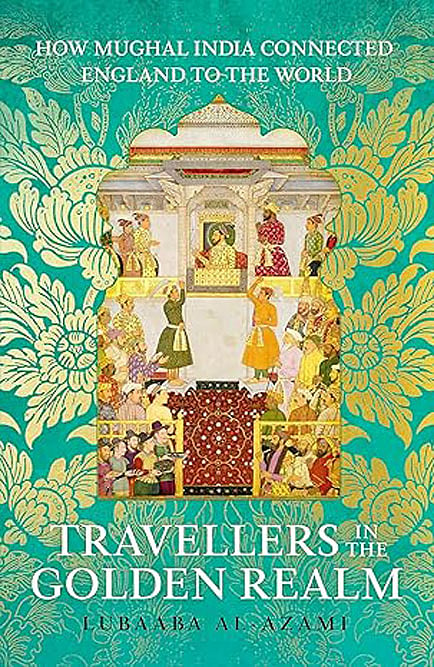Seeking India

In 1609, “a brash and daring” young merchant carrying a letter from England’s King James I arrived in the court of Jahangir. William Hawkins was here to try and make inroads into trading with the fabulously wealthy and powerful Mughal empire. Hawkins, who arrived in full regalia, and spoke Turkish, cut an impressive figure with the intellectually curious Jahangir. The king ended up offering him a place in his court, a cavalry and a stipend. Hawkins is one of several colourful characters populating Travellers in the Golden Realm, a skilful new work of non-fiction by Lubaaba Al-Azami, a cultural historian and lecturer at the University of Manchester.
The intrepid Hawkins ended up having several misadventures in India, and then went on to marry an Armenian Christian woman from the palace. Her hand was offered by none other than the king himself. That woman, Maryam Khan, Al-Azami writes, “is among the most intriguing yet overlooked figures in the early history of England and India.” Not only was she possibly the first Indian noblewoman to emigrate to England, she ended up having not just one, but two English husbands.
The history of the British Empire is a well-worn story, etched in broad strokes as the story of a violent colonial encounter between unequal powers. History books focus on how India was subdued and later ruled by a foreign nation until independence in 1947. But according to Al-Azami, there is a far richer, and more nuanced story to be told in the run-up to that colonial encounter—how for the longest time the balance of power lay squarely with India’s mediaeval rulers, with European, especially English traders very much bit players in the subcontinent. “What I found was near two centuries of decisive and dramatic encounters between these two lands that had been neglected by the majority of writings and cultural productions on the history of Britain and India,” she writes, in her wide-ranging and engaging account. “In considering this forgotten history a striking fact emerges: the British Empire in India was never intentional.”
It's the Pits!
13 Feb 2026 - Vol 04 | Issue 58
The state of Indian cities
The very first recorded arrival by sea was in fact Father Thomas Stephens, a Catholic priest who fled religious persecution in 1500s England. He landed in Goa to join the Jesuit mission, and began proselytising. Al-Azami writes: “In the process of converting Indians, however, Stephens himself underwent a remarkable and singularly Indian transformation of his own.”
Early on, the English came for trade, particularly spices and cotton, and jockeyed intensely for power, privilege and trading rights with various Mughal kings and Indian nobles. They weren’t even the first; Dutch and Portuguese arrivals proved serious rivals on the subcontinent. The story that keeps emerging is of the English as grovelling and incompetent traders, rapacious pirates and double-crossing merchants in a knotty relationship with the crown.
Although writers such as Nandini Das (Courting India) and William Dalrymple (The Anarchy) have dealt with some parts of the pre-Empire period recently, perhaps this story of Britain and India is not as well-known as it should be. Al-Azami’s work is a romp through Mughal India, starting with Babur’s reign, right through to Hawkins’s interface with Jahangir, and the East India Company’s ill-advised military campaign during Aurangzeb’s rule. Along the way we get insights into how the slave trade was connected to India, and all about the power of the Mughal noblewoman. “From wielding immense wealth and economic authority to influencing imperial decisions, managing conflicts and brokering reconciliations, the Mughal zenana was a formidable force,” we are told.
Overall, what emerges is a portrait of cultural, military and trading encounters that sets the record straight on the period leading up to colonialism. A simple story of conquest was actually a more complex series of events; Al-Azami’s book provides a fascinating account of these pre-colonial encounters. Although occasionally digressive and tricky to track multiple characters who stride in and out, the scholarship and insights are remarkable.

